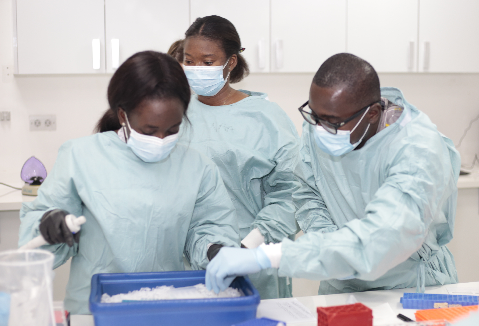
German experts support Ghana to manage virus variants
The German International Development Agency( GIZ) with its partners on the German Epidemic Preparedness Team (SEEG) is assisting Ghana to enhance its ability to detect, diagnose and manage the circulating virus variants in the country.
SEEG has deployed a team of five experts from its cooperation partners to train laboratory staff in the technique of genome sequencing of SARS-CoV-2.
Acting on behalf of the German Federal Ministry for Economic Cooperation and Development (BMZ), the German Federal Ministry of Health and the German Federal Ministry of Food and Agriculture, GIZ as well as its partners are currently supporting the Ministry of Health and the Ghana Health Service.
Concurrently, discussions are planned for broader support in zoonotic disease (diseases transferred from animals to humans) control.
Outbreaks
SEEG was initiated in 2015 by BMZ in cooperation with the German Federal Ministry of Health in response to the Ebola fever outbreak in West Africa.
It has since conducted 35 missions in more than 20 countries, including during the Lassa and Ebola outbreaks in West Africa.
The SEEG collaborators, where the experts are coming from, are the Bernhard Nocht Institute for Tropical Medicine, the Friedrich Loeffler Institute for Animal Health (FLI) and the Charité University Hospital Berlin and GIZ.
The Ghana mission focuses primarily on equipping the laboratory of the Kumasi Centre for Collaborative Research (KCCR) with the equipment needed for the sequencing of SARS-CoV-2 and providing appropriate reagents (chemicals) to perform the sequencing.
A statement issued by the GIZ Office in Accra quoted the Minister of BMZ, Gerd Müller, as saying “COVID-19 is a global pandemic that will truly be over if it is eradicated worldwide.
“That's why Germany is supporting Ghana with the much needed equipment and training of laboratory staff in genome sequencing to detect viral variants early to enable an improved pandemic response," it said.
Background
Since March 2020, there have been approximately 119,500 confirmed infections with SARS-CoV-2 and more than 1,000 deaths in Ghana.
After a large wave of infections between May and August 2020, the numbers initially dropped. A second wave of the virus infection began in mid-January 2021 and subsided again in April.
However, since the end of June, the country has been hit with a third wave, with active cases rising sharply.
Most recently, over 7,000 new cases were registered (as of August 29), after an average of only 50 cases were reported just a few weeks earlier.
The current outbreak is believed to be largely due to the delta variant, the first case which was detected on June 23.
Expanding capacity
The statement said the SEEG team would help expand the capacity to analyse the spread of virus variants in the Ashanti, Bono East, Ahafo, Ahafo North and Northern regions.
In addition, the KCCR will continue to cooperate with the Bernhard Nocht Institute for Tropical Medicine in Hamburg.
“This will further improve the existing structures and help adapt to the new COVID-19 pandemic requirements. In addition, it will help to improve diagnostic and research capacities for other infectious diseases relevant to Ghana beyond the current COVID-19 crisis,” the statement said.
The capacity enhancement in genome sequencing is the latest support provided by the German Cooperation to Ghana to curb the COVID-19 pandemic.
Since March 2020, GIZ on behalf of the German Government, has run risk communications campaigns in remote areas and at crowded places such as street markets, procured Personal Protective Equipment for partners and beneficiaries and supported KCCR with expertise and laboratory equipment.
